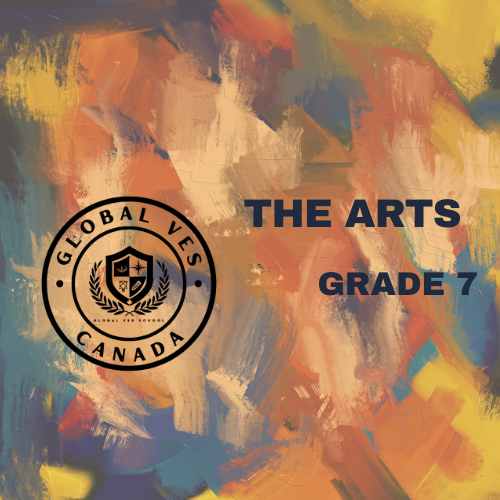
Overview
The Grade 7 Arts program fosters daily creative expression and exploration across four disciplines: Dance, Drama, Music, and Visual Arts. Students deepen their understanding of the elements in each subject area while developing skills in interpretation, creation, and analysis.
-
Dance:
Students strengthen their body awareness and explore complex movements using key elements of dance—such as body, space, time, energy, and relationship—to create original pieces that communicate ideas, perspectives, or social issues. -
Drama:
Learners expand their performance skills by integrating elements like character, relationship, time and setting, tension, focus, and emphasis. They also apply these concepts when analyzing dramatic performances and building their own scenes or stories. -
Music:
Through both creative and interpretive experiences, students compose and perform music while examining its influence in their own lives. They also investigate how music has evolved through different historical periods and cultural contexts. -
Visual Arts:
Students continue to develop their artistic techniques by incorporating influences from media and popular culture. They make intentional choices in the use of materials and design principles to produce both two-dimensional and three-dimensional artworks, including multimedia projects.
VES School offers Grade 7 courses exclusively through facilitated learning at its Global Branch Campus, with no prerequisites. As elementary-level courses, Ontario schools do not issue transcript credits.
The arts curriculum is divided into four strands:
- Dance
- Drama
- Music
- Visual Arts
- Teacher: ELSA G7
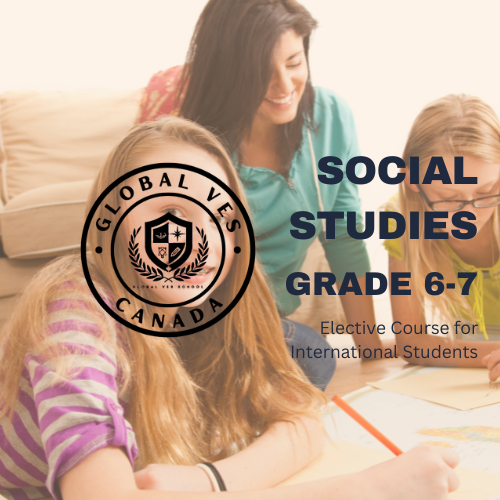
Overview – Social Studies (Grades 6 & 7 – International Students)
This course invites students in Grades 6 and 7 to explore foundational social studies themes through a global and Canadian lens. Students will examine the values and principles that shape societies, such as fairness, cooperation, cultural identity, human rights, and respect for diversity.
Learners will investigate the stories, traditions, and contributions of various communities—both within Canada and around the world. They will reflect on how historical and present-day experiences influence national identity and cultural connections. In addition, students will explore Canada’s evolving role in international affairs, with an emphasis on social responsibility, global citizenship, and collaborative solutions to worldwide challenges such as climate change, economic inequality, and human migration.
By the end of the course, students will be better equipped to understand the complex relationships between people, places, and events—and to consider how they, too, can contribute to local and global communities.
VES School offers Grades 6-7 courses exclusively through facilitated learning at its Global Branch Campus, with no prerequisites. As elementary-level courses, Ontario schools do not issue transcript credits.
The social studies curriculum is divided into two strands:
- Heritage and Identity:
Communities in Canada, Past and Present - People and Environment:
Canada’s Interactions with the Global Community
- Teacher: ELSA G7
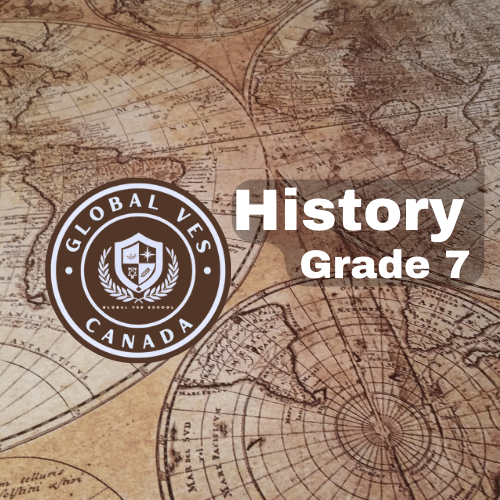
Grade 7 History Course Introduction
Welcome to Grade 7 History! This course follows the Ontario Ministry of Education curriculum and focuses on key events, people, and developments that shaped Canada from 1713 to 1850. You will explore two major strands:
New France and British North America (1713–1800): We will examine how colonization, conflict, and cooperation among Indigenous peoples, the French, and the British impacted the early history of Canada.
Canada, 1800–1850: Conflict and Challenges: You will learn about the social, political, and economic challenges faced by Canadians during this time, including the War of 1812, Rebellions of 1837-1838, and the movement towards responsible government.
Through inquiry-based learning and critical thinking, you will analyze primary sources, explore diverse perspectives, and gain a deeper understanding of how historical events continue to influence Canadian society today.
Looking forward to uncovering the past with you!
- Teacher: ELSA G7
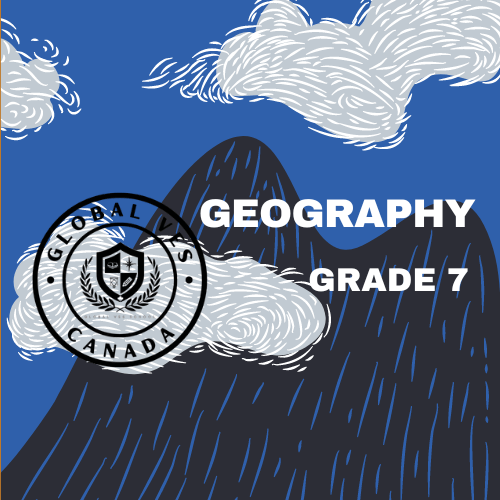
Grade 7 Geography Course Introduction
Welcome to Grade 7 Geography! This course follows the Ontario Ministry of Education curriculum and will guide you through the study of Canada and the world, focusing on two key strands:
Physical Patterns in a Changing World: You will explore the Earth's physical features, such as landforms, climates, and natural resources, and understand how these elements shape human activity and interactions globally.
Natural Resources Around the World: Use and Sustainability: We will examine how humans use natural resources, the environmental impacts of this usage, and how we can work toward sustainable practices for a better future.
Throughout the course, you’ll engage in critical thinking, map reading, and inquiry-based learning. By the end, you’ll gain a deeper understanding of global interconnections and your role as a responsible global citizen.
Looking forward to exploring the world with you!
- Teacher: ELSA G7
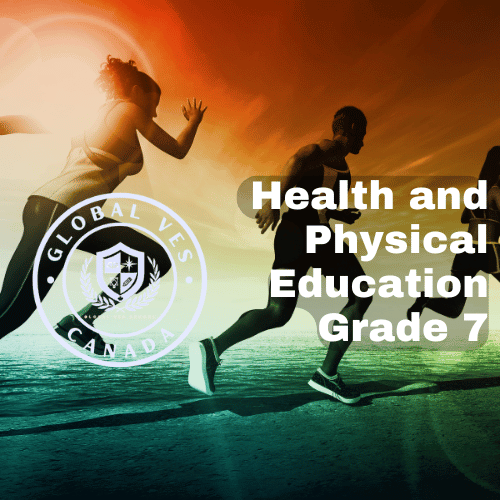
Welcome to Grade 7 Health and Physical Education! This course follows the Ontario Ministry of Education guidelines and is designed to support your physical, mental, and emotional well-being. It is divided into two main areas:
Physical Education: You will develop a wide range of movement skills, improve your fitness, and participate in a variety of sports and activities. We will focus on building teamwork, leadership, and personal fitness goals, all while promoting a healthy, active lifestyle.
Health Education: This component will help you understand topics such as healthy relationships, mental health, substance use, and human development. We will also explore strategies to make informed decisions and promote your personal safety and well-being.
This course encourages an active, healthy lifestyle and provides the knowledge and skills to make positive choices for your overall health.
Let’s get moving and learning together!
- Teacher: ELSA G7
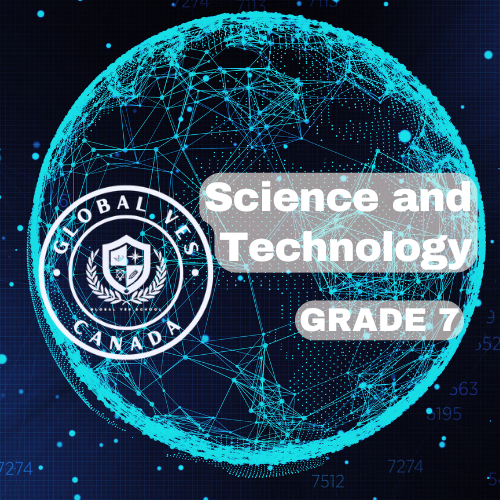
In Grade 7 Science and Technology, our students will further their understanding of the many impacts that humans have on the environment. They will explore pure substances and mixtures and examine the critical role heat plays in natural processes including the causes and effects of heat, its properties, and heat transfer. Our students will also investigate impact of forces on structures and their stability. This course is designed to be 50-75 instructional hours.
- Teacher: ELSA G7
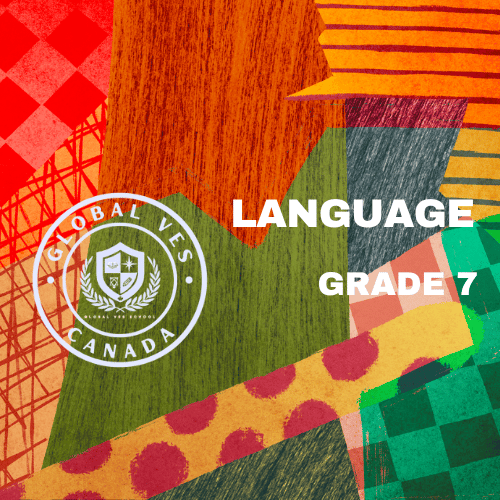
Overview
Language development is central to students’ intellectual, social, and emotional growth, and should be seen as a key element of the curriculum. The language curriculum is based on the belief that literacy is critical to responsible and productive citizenship. The curriculum is designed to provide students with the knowledge and skills they need to achieve this goal.
In grade 7, students are encouraged to write about and discuss topics of relevance that matter in their daily lives. The language expectations focus on the consolidation of students’ language knowledge, skills, and strategies, and their ability to use them independently and effectively to understand, reflect on, apply, and communicate information and ideas, for continued learning in school and in a multicultural, multimedia world.
VES School offers Grade 7 courses exclusively through facilitated learning at its Global Branch Campus, with no prerequisites. As elementary-level courses, Ontario schools do not issue transcript credits.
The language curriculum is divided into four strands:
- Text Analysis and Composition: Focus on reading, writing, and text analysis.
- Public Speaking Skills: Crafting and delivering speeches.
- Storytelling and Narratives: Writing and analyzing story structures.
- Exploring Non-Fiction: Exploring complex texts.
- Creative and Media Expressions: Engaging with creative and media texts to build critical thinking and communication skills.
- Teacher: ELSA G7
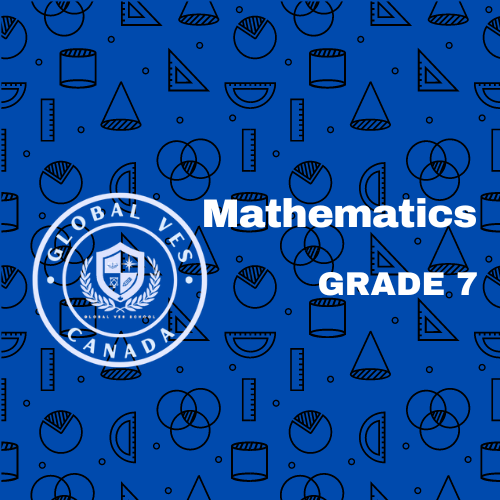
Throughout this grade, in order to promote a positive identity as a math learner, to foster well-being and the ability to learn, build resilience, and thrive, students will apply, to the best of their ability, a variety of social-emotional learning skills to support their use of the mathematical processes and their learning in connection with the expectations in the other five strands of the mathematics curriculum. Students learn how to cope with stress and manage complex challenges. Students learn to break down a task into smaller portions, make a plan and take it one step at a time.
- Teacher: Daniel Cho
- Teacher: ELSA G7
